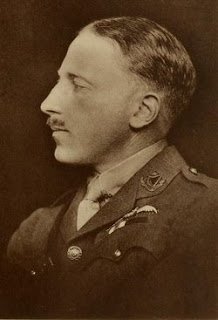 |
| Major Robert Gregory |
On January 23, 1918, an Irish pilot and recipient of the
Military Cross was killed when his plane fell from the sky over Padua,
Italy. The airman was Major Robert
Gregory, remembered by W.B. Yeats in his poem “An Irish Airman Foresees His
Death.” Gregory was the only son of Lady Augusta Gregory, playwright and close
friend of W.B. Yeats, and it was at Lady Gregory’s urging that Yeats wrote in
memory of her son.
An Irish Airman Foresees His Death
 |
| Recruiting poster, published in Dublin |
I know that I shall meet my fate
Somewhere among the clouds above;
Those that I fight I do not hate
Those that I guard I do not love;
My country is Kiltartan Cross,
My countrymen Kiltartan’s poor,
No likely end could bring them loss
Or leave them happier than before.
Nor law, nor duty bade me fight,
Nor public man, nor cheering crowds,
A lonely impulse of delight
Drove to this tumult in the clouds;
I balanced all, brought all to mind,
The years to come seemed waste of breath,
A waste of breath the years behind
In balance with this life, this death.
—W.B. Yeats
Yeats’ poem for Gregory presents a solitary pilot,
haunted by the vision not only of his death, but also of his past and his future
(“ a waste of breath”).
Alone in the clouds, the airman distances himself from both the
political turmoil of the Great War and the struggle for Irish independence; he
is driven instead by a “lonely impulse of delight.” What anchors him to this world are local,
personal concerns: a small town in Galway and its impoverished people.
 |
| Old Kiltartan Church and Graveyard, photo by Tony O'Neill |
Yeats’ poem idealizes Robert Gregory as a man who refuses to
be categorized as a war hero, yet the reality of Gregory’s motivations are more
complex. Personal diary entries from 1915 suggest that one of the reasons he
joined the war was to escape the family turmoil caused by his adulterous affair
with another woman. In 1915 at the age
of 34, married and with three young children, Gregory enlisted with the
Connaught Rangers, transferring that same year to the British Royal Flying Corps, “at a
time when the average life expectancy for new combat pilots had been estimated
at only three weeks.”*
 |
| Yeats, Lady Gregory, and Robert Gregory photo by W.E. Bailey, courtesy of Colin Smythe |
 |
| Gregory's grave, Padua, Italy |
“An Irish Airman Foresees His Death” highlights the complexities of the Great War and modern memory: simple narratives of heroism often smooth over contradictory details. Recent editorials in Irish newspapers have argued that despite the 40,000 Irishmen killed in the First World War (compared to 1,400 in the Irish War of Independence and several thousand in the Irish Civil War), “until recently, Irish participation in the Great War was airbrushed out—except in Northern Ireland.”†
Also frequently erased from the history of the war are
accounts of the Spanish flu, a disease not created by the war, but weaponized
and spread by it, a pandemic that “killed at least eight times more people than
the war did, accumulating an estimated eighty million deaths worldwide between
1919 and early 1920.”††
Yeats’ poem for Major Robert Gregory is remarkable both for
what it reveals and what it obscures. The poem reminds us that Irish history, the
Great War, as well as the life and death of Robert Gregory are all complex
realities: tangled, disputed, and defying easy interpretation.
-------------------------------------------------------------------------------------------------------
* James Pethica, “Yeats’s ‘perfect man,’” Dublin Review, vol. 35, Summer 2009, thedublinreview.com/article/yeatss-perfect-man/.
** Ray Burke, “Challenge to official accounts of Gregory
death in WWI,” RTÉ, 6 Jan. 2018, http://www.rte.ie/news/analysis-and-comment/2018/0101/930446-robert-gregory.
† Sean Farrell, “It’s a long way to Tipperary: Two books on
Irish participation in WW1,” Irish
Independent, 14 Dec. 2014, www.independent.ie/entertainment/books/book-reviews/its-a-long-way-to-tipperary-two-books-on-irish-participation-in-ww1-30824693.html.
†† Jane Elizabeth Fisher,“Teaching the 1918 Influenza
Pandemic as Part of a World War I Curriculum,” Teaching Representations of the First World War, edited by Debra
Rae Cohen and Douglas Higbee, MLA, 2017, p. 193.
Sad that he had made it away from the lethal environment of the Western Front and fell to earth near Padua
ReplyDeleteA warrior man of the arts who flew and mentored Mannock V.C! What a complex man - and his relationship with Yeats was strained to say the least - and all ended with a mysterious death. Very much worthy of further study.
ReplyDeleteVery much indeed -- a fascinating poem, a fascinating man. Glad to see Mannock getting mentioned here, too -- his story is also worth remembering.
DeleteAlways loved this poem, but didn't know the background to it. Fascinating article. Thanks for sharing your research!
ReplyDeleteThanks for reading!
DeleteFascinating blog and terrific article. How appropriate for our own Pandemic that Major Gregory might have lost consciousness due to the Spanish flu vaccine....
ReplyDeleteThanks for reading and commenting.
Delete